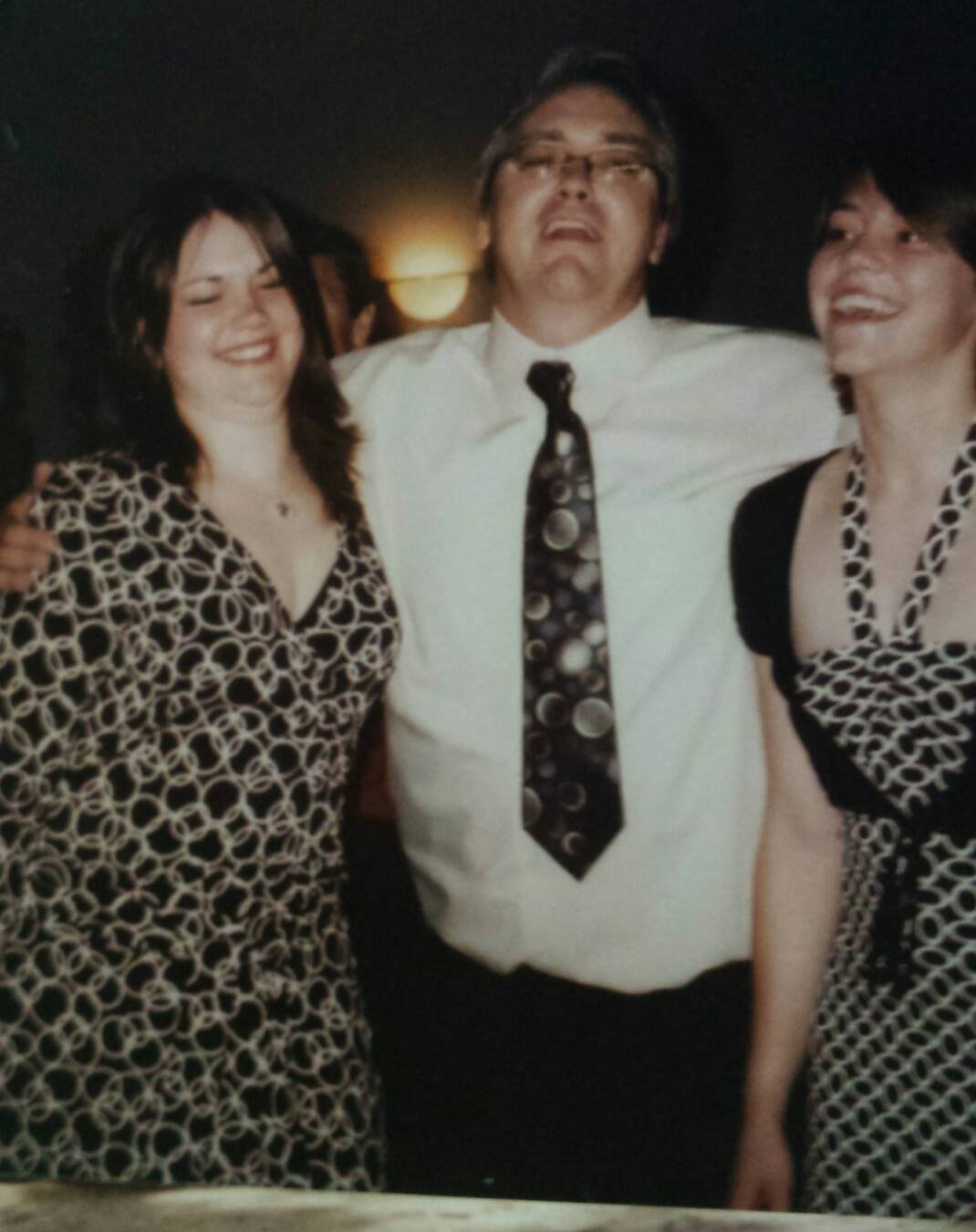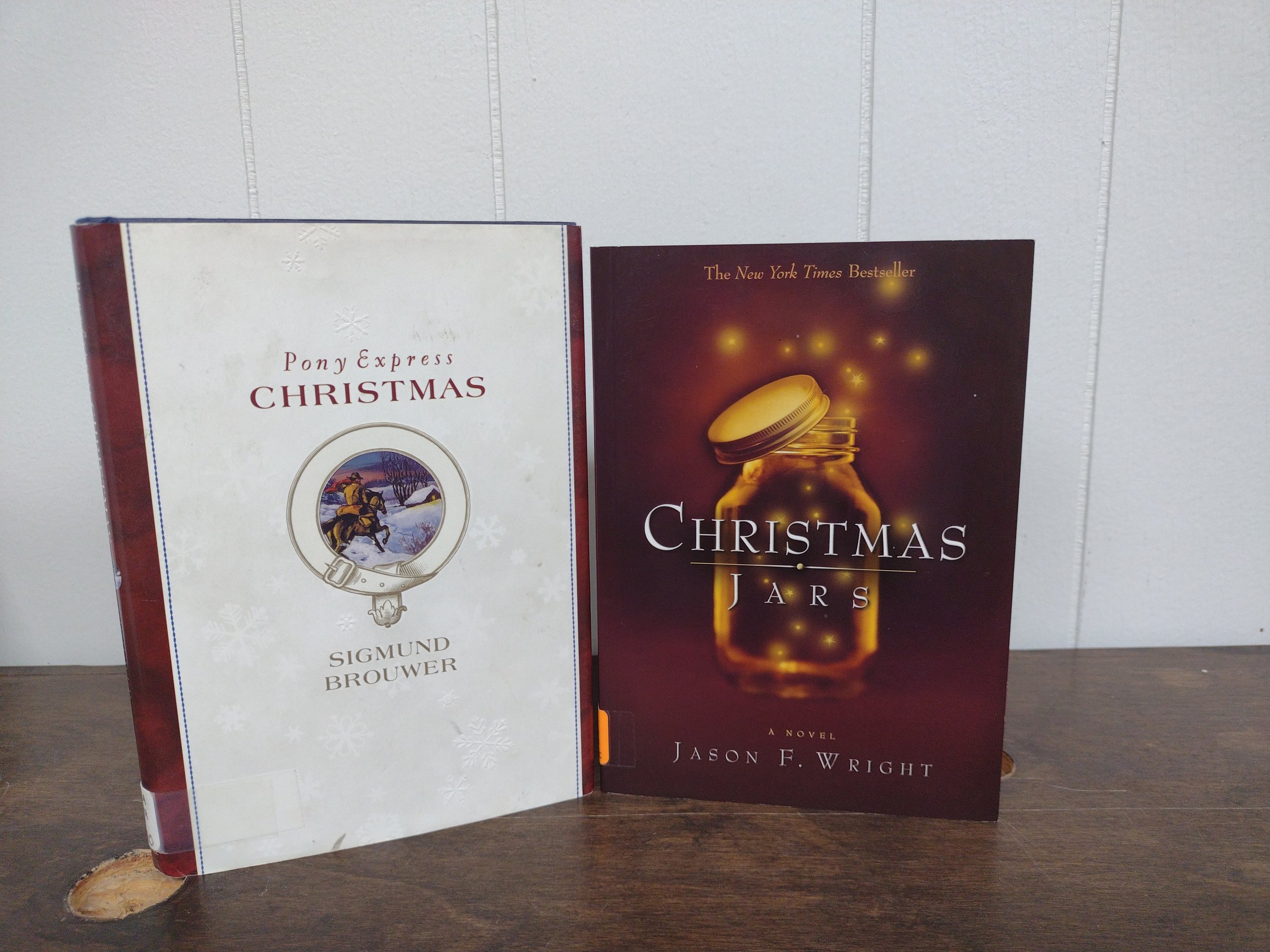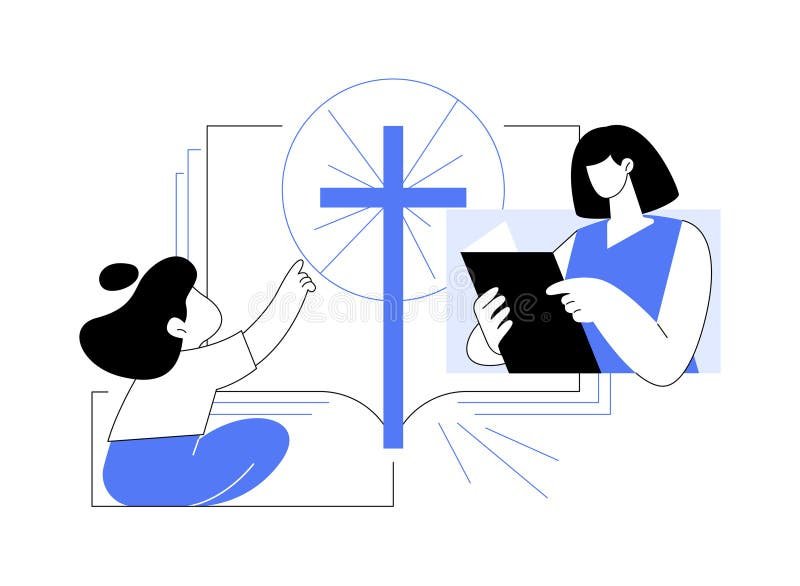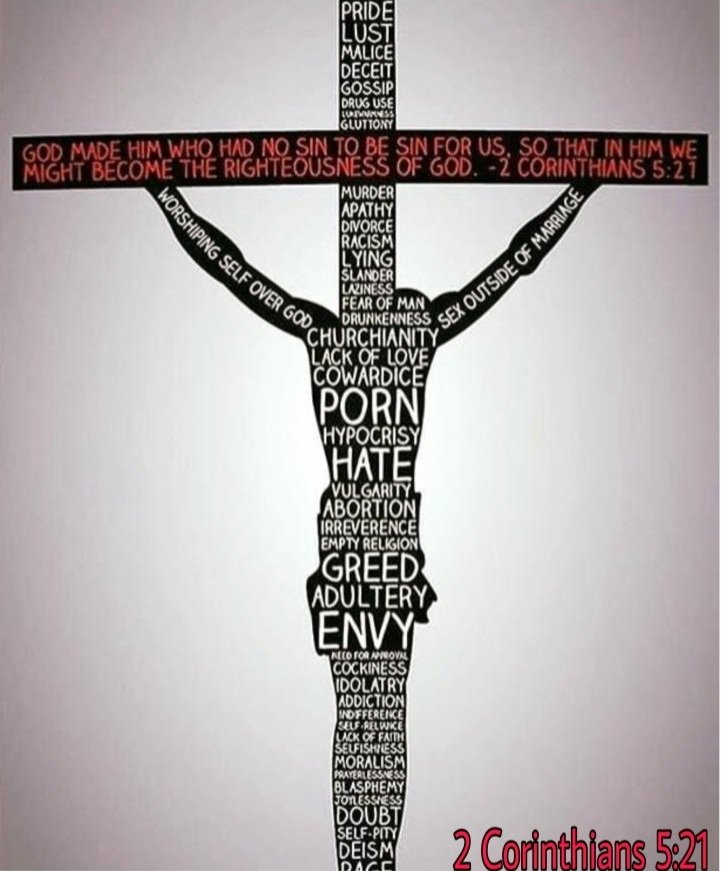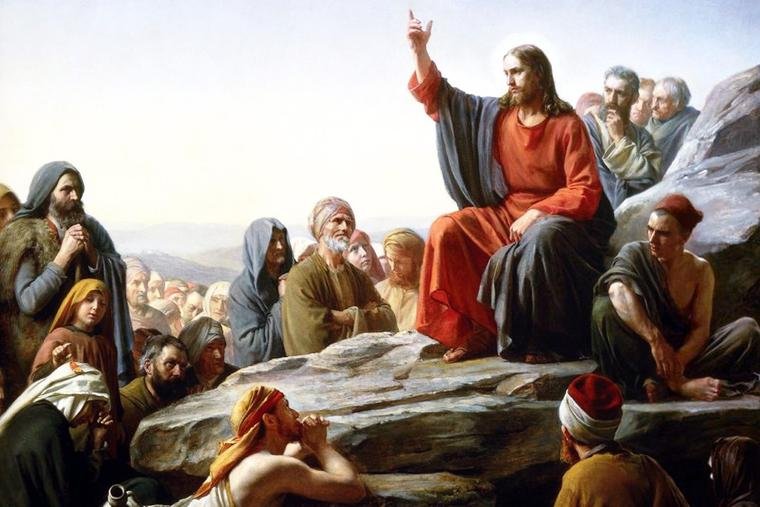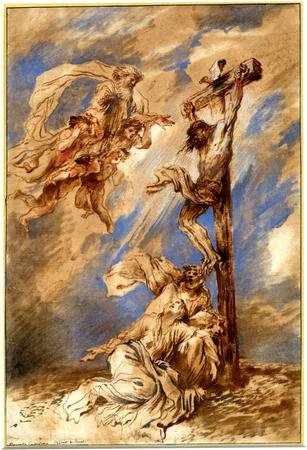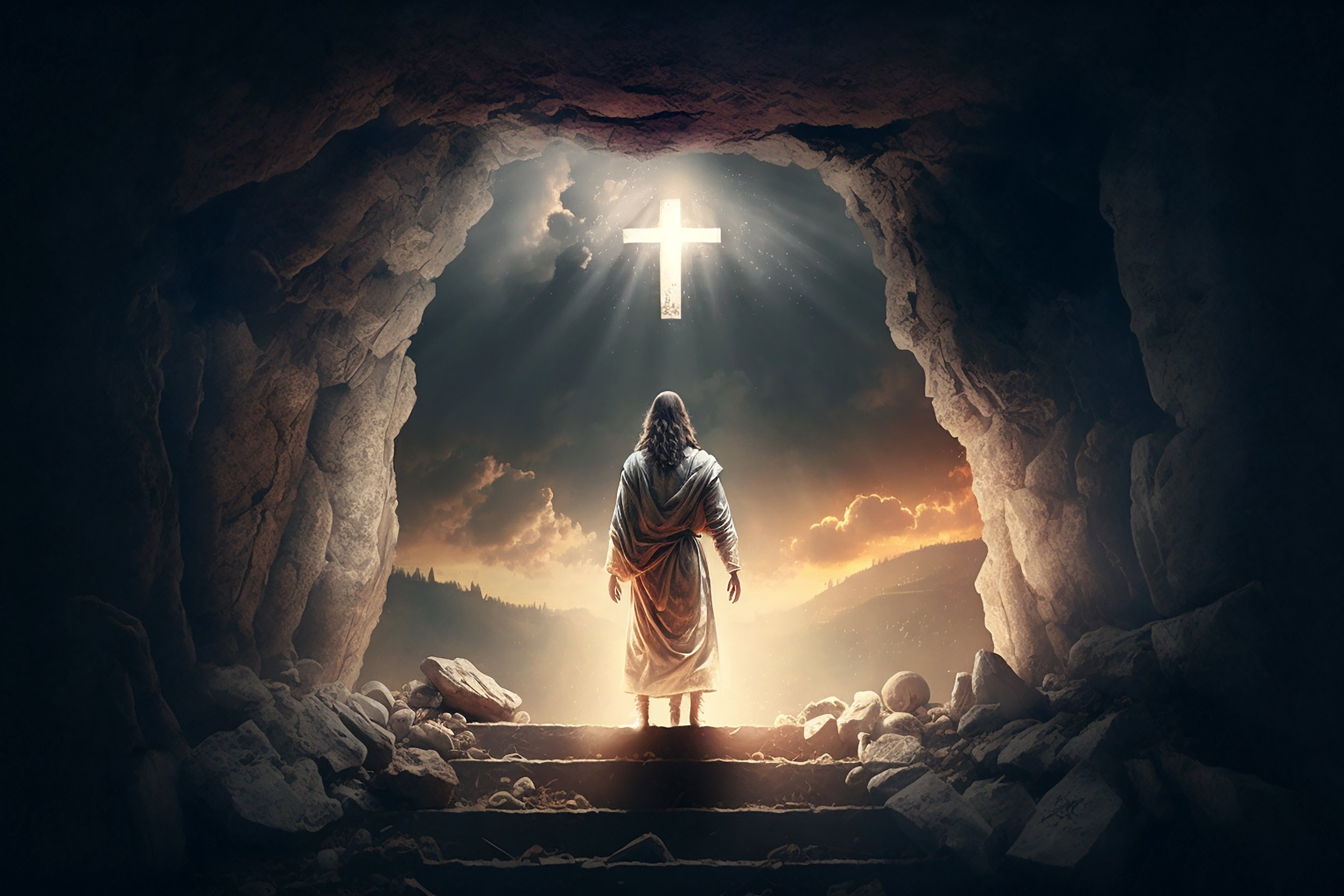In the Christian community in my small home town of Scottsbluff, Nebraska, my dad (Dan Hovseth) was well known. He was the type of guy who was either loved or hated. He never backed down from a lively debate and since the time he accepted Jesus as his Savior when I was five years old, he was a fierce defender of the faith, studying every apologetics book available and passing them out like candy to anyone he could force them on. Kids I went to school with often assumed he was a pastor and would be shocked when I’d explain to them that he actually drove coal trains, he just really loved Jesus and spreading the Gospel.
But, my dad was far from perfect and he would be the first to admit that. He was simply a human saved by grace. His humanity plus his eccentric/slightly bi-polar qualities, made my childhood rocky. It was a series of high mountain tops and deep valleys. As I grew older, and my dad grew closer and closer to God, the valleys became less frequent and less deep. I got to witness God transform my dad’s life in ways everyone had believed were impossible.
He passed away August 22nd, 2015 when I was 26 years old from non-smokers lung cancer. It took me quite awhile to process the grief from his death—I’m sure I’m still processing some of it. But, about a month after his funeral, when I was back at college across the state, I sat down in a fancy pretzel restaurant and silently cried in public as I hand-wrote the first draft of this non-fiction story (I just couldn’t wait until I got home to get these words out). It was the best way I knew how to sort out the various waves of emotion and memories which had been fighting to break loose. It represents the state of my mind during the first few minutes of my life after I found out he had passed away. Time seemed to slow down during those minutes as my mind jumped me from flashback to flashback of my life with my dad.
Be forewarned, this isn’t a pretty story. The language isn’t always clean. But, it is real. It is human. And, it shows the grace of God in real, human lives.
(Before you get concerned, don’t worry, my mother has read and approved of me sharing this story, and my father would have too—anything to show the truth of Christ’s sacrifice and God’s salvation and grace in our lives.)
This is also the flagship story of my brother, Giles Hovseth, and mine short story compilation book which we dedicated to our father and titled, “Our Dad is Dead: and Other Fun Things to Talk About”.
Well, with all that said, here it is: a glimpse into my grief stricken memories.
My Dad is Dead
by Amanda Hovseth
“Amanda…” my brother’s voice breaks, like he’s choking on something. “Amanda, wake up.”
“What? Yah, Giles what…” I’m answering before my eyes open, my mind determined to respond before my body is willing.
“Dad’s dead.”
“Wow, really?” Wow? Did I really say wow? How did Giles get in here anyway? The door is open…I left the door open. When I went to bed a couple of hours ago I felt like I needed to. Twenty-six years old and still superstitious, ridiculous. Good. It would have hurt him to have come downstairs to a locked door.
“Yah.” He coughs. “It just happened…just now.”
“Okay, I’m coming.” I reach for my glasses. Have to get upstairs. Can’t wait for contacts, in a hurry…a hurry, why? Time is already up. Dead. Gone. Permanent. I put on my glasses. My brother has left, he’s waking up our other brother, right outside my room. My baby brother, the youngest, my babiest. Dad’s dead. My room is dark but light shines through the opened doorway, I hurry towards it.
I am twenty-five years old, back in college, and looking forward to a road trip home with my dad for Thanksgiving Break. When he says he is proud of me now, it feels real because I am finally proud of myself. I had never really believed him before because a silent voice inside had always read the undertones in his words as disappointment. But, now my first book is published, and the majority of reviews are positive, his review is positive. He stops at every bookstore, school, and church on his road trips to tell them about my book. His ceaseless peddling of my work has shown me he believes I have something worth saying.
He’s temporarily stationed in Arkansas for the railroad and is going to drive out of his way to pick me up. We will have seven hours alone together and I am excited to talk to him about my new life, my new future.
My phone rings, he tells me he is running late. He took a nap after work and ended up sleeping much longer than anticipated. I say it’s okay because I’ll just nap while I wait for him.
Five minutes later he calls again. He sounds tired and he stumbles over his words. His boss says he has to work later that day. I might as well drive myself and we will meet back home. He is very sorry. We hang up and I stare at the phone. It’s okay, I will still get to see him at home. But a realization penetrates my hopes, he has never missed family time for work before. He has always talked his way out of or into anything he wants. He is a real life con-artist. It doesn’t compute. I shake my head and smile. He’s an easily distracted guy, I’m sure it’s nothing.
I use the bathroom and then grab my bag to leave. My phone rings. It’s my mom, probably to check on our travel status. I answer. There’s two seconds of silence…“Mom?” She sobs. I put my bags down, “What’s wrong?”
“Have you left yet?”
“No, just about to.”
“Good, you might need to go to Arkansas. Your father had a stroke, he’s in the hospital. He says he’s fine, but I know he’s not. I’m sorry, you’re the closest… he needs someone there.”
“Okay…” I check google maps. “I can be there in eight hours.” She thanks me. “I’ll head out now.” We hang up.
My phone rings. “Mandy?” My dad’s voice is soft and wavers as if he is half asleep.
“I know, Dad, Mom just called me. I’m on my way to your hospital.” I prepare for an argument. For him to say he’s fine and my mom shouldn’t have imposed…
“Are you sure?”
“Yes, I want to come.”
“I’ll text you my room number when they tell me.”
“Love you, Dad, see you soon.”
“Love you too.”
I’m eighteen years old, my dad’s calling me a stupid b**** and shoving me backwards. I fall onto the couch. My mother screams. “DON’T YOU EVER! Don’t you ever talk to my daughter like that!” She runs at him and is pounding his chest and arms with her fists. He tries to block her blows while moving her away. She stops, exhausted and drops down next to me, pulling me into her arms. My dad is pressing his palms to his forehead. He throws a chair across the room. Then grabs car keys and heads out the front door. My mom is telling me not to listen to him. I barely hear her. I’ve never been called a b**** before, probably never will be again…at least not by someone who knows me.
I’m twenty-three years old, in a hotel in San Antonio. It’s just me and my dad, he’s been temporarily stationed here by the railroad, “borrowed out” they call it. He didn’t want to go alone, so I decided to go with at the last minute. We’ve been here a month and a half now. He walks into the hotel room. I sit up in bed.
“Dad? Your back already? How’d you get back?” Normally I have to pick him up from the depot when his trains come in.
He’s ruffling his hair; his eyes look hollow. He sits down to undo his work boots, but I can tell his skin is crawling. I wait, he’ll talk, it’s usually hard to stop him from talking.
“I hit a guy with my train. A boy. A man. He was in his twenties.” He glances at me every once in a while as he talks, but never makes eye contact. “He just stepped out in front of the train. I think he had headphones on. They phoned his parents…came to the tracks…apparently his brain wasn’t right…he was…autistic or something.”
“What? Why was he walking alone if he was that autistic?”
“I know, right!” My dad is looking in the freezer, probably for ice cream. He pulls it out and puts it back, his skin is pale. “Some people just don’t…they just don’t think…I’ve hit cows before. Those trains, they really leave nothing. Just pulp, barely tell it’s human. He wasn’t even close to the size of a cow.” He’s opening a bag of beef jerky.
“You know it’s not your fault, right? You can’t stop those trains on time. If you could have, you would have.”
“Of course it’s not my fault!” He paces back and forth across the length of the room. “No, I’m okay. I could see him there from a ways away. He was just walking, and I thought he would stop. I honked the horn just in case. He just kept walking. I thought for sure he would stop, why wouldn’t he stop? Everyone stops. Then he didn’t…he just didn’t…stepped right out in front. Train didn’t even bump. We pulled the breaks, I thought maybe he’d made it across, where I couldn’t see. Trains take a long time to stop though.”
“Are you fired?”
“I thought for sure I would be, but no. They want me to see a therapist and I have three days off of work. I told them I don’t need a therapist, it wasn’t my fault, I had no hand in it. His parents didn’t even think so. Said he was living on his own for a year now, his roommate didn’t know he was autistic.” He takes a bite of his jerky. “Did you have plans for today?”
I do, I planned on meeting up with another railroader’s wife and daughter and going to see the Madame Tussauds Wax Museum and Ripley’s Believe It or Not. I ask if he wants to join.
He wrinkles his nose. “No, call me when you’re done though.”
“I can stay if you want.”
“No, no Mandy, really I’m fine. It wasn’t my fault.” He’s pacing again.
“Of course it wasn’t but we can go another day, when you’re at work.”
“Really,” He raises his voice and waves me off. “I’m fine. Call me after.”
I leave the room and go to the museums. My phone is turned off inside because it’s proper etiquette but when I make it to the gift shop and turn it on to call my father I realize I have six missed calls from him. My stomach flips and I call him back.
“Hello?” He answers and the phone crackles from the wind blowing past. “Mandy? Where’ve you been?”
“In the museums I just got done and called you.”
“It took that long?”
“Yah, I guess.”
“Well I’m out front.”
I turn to my friends and tell them where I’m going. As I walk to the front of the museum I spot him on a bench. He smiles and waves, but his eyes still look hollow. My heart aches. Poor guy, I should have never left him alone.
I’m nine years old and I’ve had a sleepless night. My parents are up, yelling at each other. I am lying in bed, pretending to be asleep and wondering if my sister in the bunk below me is actually asleep or if she is crying silently as well. I think that perhaps I should climb into bed with her and comfort her, but I don’t know how. And if she is asleep then I’d only wake her up. So, we lie alone.
It’s the next morning, I slip into the bathroom to use the toilet. My mom is in the shower but there is only one bathroom so we often double up.
She steps out as I’m brushing my teeth and I notice a long dark bruise on her right thigh. I ask if she’s okay. She insists she is, she doesn’t even know how she got that bruise.
My dad is nowhere to be seen. Someone has obviously tidied up the living room. Part of me is worried my dad won’t come back. The other part knows that when I return from school there will be a new vase of flowers in the window and my parents will be waiting to hear how my day went. Like every time before.
I’m twenty-six years old, I came home for the summer because my dad has been diagnosed with cancer. Turns out he never had a stroke, only seizures brought on by brain tumors. My parents found me a job in road construction. I work anywhere from eight to fifteen hours a day. I’m walking up the stairs at five a.m. to get ready for work. My dad is awake in the living room. He always wakes up to send my brother and me off to work. He is looking at his phone. The low morning light allows the glow from his phone to accentuate his bone structure; sharp edges which used to be concealed in muscle. I wonder at how quickly his athletic physique has abandoned him.
“Mandy! Good morning! Have you seen these pictures of Giles and Jamus?”
Jamus is one of my cousins, he’s four years old and can’t digest any food at all, so he lives solely on a powdery nutrient substance. Quite frankly if people didn’t know he was sick, they wouldn’t guess it. He has curly red hair and chubby cheeks that even cherubs would envy. He enjoys labeling days as “Hug Day” and then distributing hugs throughout the house. When he has an allergic episode he dresses up as Iron Man and faces the situation head on. He is just absolutely adorable and ceaselessly cheerful. He also loves my father, calls him his best friend.
“Yah.” I chuckle. “Jamus is super cute.”
“I know!” My dad lets out what is best described as a girlish squeal. “I just keep thinking, he couldn’t be any cuter, and then I flip to the next picture and…he is still even cuter!”
I laugh as I scoot my mom’s cat out of the way and head out the front door.
His voice trails after, “I love you Mandy, and I’m proud of you.”
He has said that every morning this summer.
I don’t know who made it to the stairs first, me or my brothers. It doesn’t matter, we have all climbed them and are now walking through the kitchen. My mom is already on the phone, it reminds me I’m late to the show. Time is slipping through my fingers at a speed I have never before encountered.
I’m twelve years old. My dad is standing by the stove with a big butcher knife in his hand. Neighborhood kids are watching and gasping as he continuously flips the knife into the air and catches it while making various faces of fear and shock. Tootsie Roll, our little Yorkshire Terrier, is hanging out by his feet. I call her over and pick her up. My dad glances my way and I frown at him. He knows this type of thing worries me. He calls out. “What, Mandy? You don’t trust me?” Then he throws the knife even higher. I roll my eyes and leave the room. He can insist on dropping a knife on his foot, but he can’t make me watch.
I am nineteen years old and I don’t know how many days I have been lying in bed. I share a house with two friends. My dad hadn’t wanted me to move out. He had yelled and yelled, calling me a fool for wasting the money. Then he had scoured my new apartment from top to bottom, looking for ways to make it safer. I don’t know what I am doing with my life. College is boring, and the end seems so far away. I haven’t picked a career and have no idea how to go about doing so. And I just keep gaining weight no matter how much I work out. A month ago some doctor gave me antidepressants and I don’t know if I’ve left my bed since. I’ve missed every single college class, and I’ll tell you what, I couldn’t care less. I couldn’t care if the world caught fire and burned up right in front of me. I couldn’t care if a masked man entered my room and skinned a box of puppies. I couldn’t care if Orlando Bloom asked me to dinner.
My phone rings. I answer. It’s my father. I can barely hear him. I’m not sure if he’s on speakerphone or if I’m still half asleep. While he talks I stare at the wall which I painted pink five months ago. The call is short. He tells me he loves me no matter what. He knows I’m going through some stuff and I might be worried he’d be disappointed. But he’s not, it doesn’t matter, he loves me anyway. The phone is beeping now. He must have hung up. I pull it away from my ear and notice the time. It’s time to take my antidepressant. I pick up the box and roll onto my back. I hold the little white pods in front of my face and stare at them. The sun sets outside my window, slowly obscuring my view. I blink, throw the pods at the trash can, and stand up. It’s time to take a shower.
I’m two years old, it’s the middle of the night and my mom is pulling me out of bed and bundling me into the car. I ask her where we are going.
“To pick up your father.”
It feels like we have driven forever. I am lying with my head resting by her pregnant belly when we pull up in front of a bar. I know it’s a bar because of the neon lights. All bars have lights like that. She tells me to wait in the car and grabs a bat from the back seat. I wonder if my dad needs it to loan to a friend. Then she pauses and puts the bat back down.
Minutes later she is stomping out of the bar with my dad stumbling behind her, a bright red imprint of a palm on his cheek. They both get into the car without saying a word. I climb onto my dad’s lap and I sleep the rest of the way home.
I turn the corner from the kitchen into the hallway. I know he will be there, at the end and to the right. I know he will. But he won’t. I don’t want to go. I have to go.
I’m twenty-four years old and at a Friday night Bible study with my father. People are asking him about his testimony. I smile because I know my dad doesn’t like giving his testimony. He says that everyone thinks their life story is worth telling and most people are wrong. They insist. So, he gives them a piece of information which I always expected but never confirmed until then.
“When my lady told me she was pregnant with Mandy I panicked. I knew I should marry her and take care of the kid, but how was I supposed to do that? I was just a kid…I gambled a lot then, had gotten in too deep with the mafia. I started watching Oprah at my mom’s house, thought it might help, it didn’t much. My brother…the one, he’s in Omaha now but was in Alliance, Denny, his wife got me an interview with Union Pacific Railroad. So, I drove through the night, from Chicago to Western Nebraska, took the test, and they gave me the job. I figured the mafia goons wouldn’t drive to Nebraska lookin’ for me, cuz really, you can’t squeeze a dry sponge anyway. It worked, I paid them off later.…But, if it wasn’t for Lori’s pregnancy I would have never looked to leave. If I had never moved to Nebraska I would have never met Pastor Rich. And if I had never met Rich, I…who knows for sure, but I think I would not have ever been convinced of my need for a Savior. I thought I was good enough to make God happy. I suppose everyone thinks that. Ironic isn’t it, wanting to earn love and failing; when all along I could’ve gotten it for free?”
I’m twenty-three years old. I just graduated from Bible College. My dad has called a family meeting. He wants to study the book of Proverbs. It’s a good idea in theory, but family meetings never end well. This time it’s my fault.
I’m mad. My stomach is clenching and my jaw is tightening. He’s picked a study guide which is full of big words and nonsense phrases and ideas. I try to explain, “Proverbs is simple. This book is ridiculous. Man’s way of overcomplicating God’s Word to make ourselves seem more sophisticated.” Normally my dad would understand this. I know for a fact he would agree with that general statement. But this isn’t normally, this is a family meeting, and something goes wrong.
I’m grabbing my backpack, mentally calculating what is inside…my wallet, laptop, flash drive (with all my stories on it), phone…while I’m yelling at my dad and telling him I’d be better off alone. He yells back, something like, “Go ahead then!” I slam the door and stomp two miles to the library.
It’s been five hours in the library. I have friends I can call, plenty of friends who would let me move in as long as I need. Even a couple of guys I know who would welcome the chance to get closer to me, guys my dad wouldn’t approve of. But if I called them, if I called any of them, then the world would know. The world would hear of times he yelled, the time he broke our kitchen table, and they would see nothing else. They wouldn’t actually see him and how much he truly has changed throughout the years. Everything he has worked for, everything I have worked for, would be ruined.
I’m walking through my parents’ front door. The rest of my family is in the living room, quietly reading various books and watching TV. They look up when I come in, nod, and keep reading. My dad isn’t there. I wonder if I can sneak into my room and pretend like nothing happened. Our cat, Shale, is walking by. He pauses in front of me. Shale was a rescue, so he’s always hiding, never making a peep. Normally he runs when the front door is opened, instead he looks at me and walks down the hallway. I follow him. He leads me into my parents’ room. My dad is on the bed with his back towards me and a phone in his hand. Shale jumps up onto the bed and meows. My dad turns around.
Instantly I start crying. And I say, “I came back. I don’t want to break up our family over a dumb argument.”
My dad is on his feet and hugging me. “I’m glad you came home. I didn’t know where to look.”
I’m twenty years old and I work as a secretary at Regional West Medical Center. My main job is organizing patients’ charts and putting doctors’ orders into the computer. It’s been a hard twelve-hour shift and I’m exhausted when I walk through my parents’ front door. A couple of my friends are over, so I try to put on a smile. My dad isn’t fooled and instantly notices my sour mood. He insists on knowing what has upset me. I keep it simple because I want to move on, telling him the job is hard because I seldom get bathroom breaks and the doctors are pretty rude. He’s furious. He calls my friend Andy over, grabs a phonebook and the car keys, and asks me what the doctors’ names are.
I ask, "Why do you need their names?"
He says, “No one gets to be rude to my daughter, no matter who they are!”
Despite his rage, I smile. He and Andy plan on teaching the doctors “a lesson”. I know what type of lessons my dad teaches people and I know our town needs its doctors, no matter how rude they are. So, I convince him the doctors weren’t rude to me specifically. They are just rude in general. I really am okay. At this point, I’m beaming because of how protective my father and friends are, so he believes me and is content.
Instead of teaching lessons, he and Andy make homemade Chicago-style pizza.
I’m five years old. We are driving across the country, back home from my grandmother’s funeral. It’s nighttime. My parents laid down the seats in the back of our red minivan so that my siblings and I have a huge bed. I stare at the stars through the window and listen to the consistent calm of the wind blowing past.
My grandmother is dead. I cried when they told me, even though I barely knew her. I knew the concept of a grandmother, and mine was dead. Then I saw her body. It was white and cold, painted and posed. It was not her. They placed her body there, but she was not in it. I crawl to the front of the van and sit, leaning forward between my parents’ seats. I want to know where grandma is.
They tell me something my mother has known since she was young, but my father had only learned recently. Grandma could be in Heaven if she had trusted God to get her there. They just don’t know if she did.
I feel chills. How does someone trust God to get them to Heaven?
They tell me that every time we do the opposite of what God wants us to do, we have to be punished for it. If we decide to try to handle the punishment ourselves, then God can’t let us go to Heaven, because not going to Heaven is the punishment. But even when God is angry, He loves us and wants us to go to Heaven. So, He decided to take the punishment, Himself. He came to earth as Jesus, never did anything wrong, and then was killed in our place. Now we have a choice: we can pay for our sins ourselves, or we can believe that Jesus already paid for all of our sins and accept that payment as a free gift.
I told them I wanted Jesus to pay for my sins. They taught me how to pray. That night I met God. I have never felt more like I could fly than at that moment. I breathed deep. I told my sister about it and she joined me in prayer. Then I went to sleep, trusting my dad would get us home safely and knowing my God would someday bring our souls home safely.
I step into my parents’ bedroom. It smells like a hospital: disgustingly sterile. My dad’s body is there. His eyes are open. One is staring in a different direction than the other. His mouth is also wide open. It has been open for days. He slept with it open. My mom has turned off the oxygen machine and taken the breathing tubes out of his nose, he doesn’t need them anymore. The machine’s constant clicking and blowing was a reminder of how much it hurt him to breathe—but now the world sounds wrong. We all step in, take a look, and leave. My mom is calling my uncles, they will be over soon. She says she has already called hospice. I say I am going downstairs to change since company will be coming.
I hurry back up the stairs. One of my brothers is telling the other that he needs to touch my father in order to make it real. The other is protesting, saying he doesn’t need to. I brush by quickly and say, “Don’t push him into anything, we all grieve different.” Then I’m back in my parents’ room, alone with my father. I step up to him and place three fingers under his jawbone as if to take a pulse…I’m six years old, I’ve had a nightmare. I know if I wake my father up he will let me climb into bed and I’ll be safe. I can sleep easy…No. No. I’m twenty-six years old. I’m twenty-six years old and I’m touching his neck. His skin isn’t quite cold yet. He’s not waking up. He’s not moving. He’s dead. My dad is dead.
I say, “I love you Dad. I’ll see you later.”
I’m twenty-five years old, it’s Thanksgiving Break and I’ve made it to the hospital in Arkansas. My dad is in the hospital bed. He’s on the phone with our pastor. I hear him struggle to speak so I step into the bathroom to give him privacy. It’s on speakerphone so I can still hear. My dad is always worried cell phones will give us cancer, so he doesn’t like holding them up to his head. Our pastor doesn’t want to let my dad give up hope. He says, “There’s still a chance. You could survive…you’re not dying before me.” I stare at the sink because I don’t want to look in the mirror. My dad says, “No listen. You know the story of John Bradford, right? I want my kids to know. I want, after all this, the one thing they should learn from my life…‘There but for the grace of God go I’.”
I take my fingers off of my dad’s neck. I walk out of his bedroom and into the bathroom. I close the door, and I cry.
“Brothers we do not want you to be ignorant about those who fall asleep, or grieve like the rest of men, who have no hope. We believe that Jesus died and rose again and so we believe that God will bring with Jesus those who have fallen asleep in Him.”
Click here to learn about what exactly it was that changed my father’s life (the Gospel message).
Click here for more things written by Amanda Hovseth.
This series of blog posts titled, “Holding on to Reason”, is named after Amanda’s favorite C.S. Lewis quote: “Faith is the art of holding on to things your reason has once accepted, in spite of your changing moods.”












